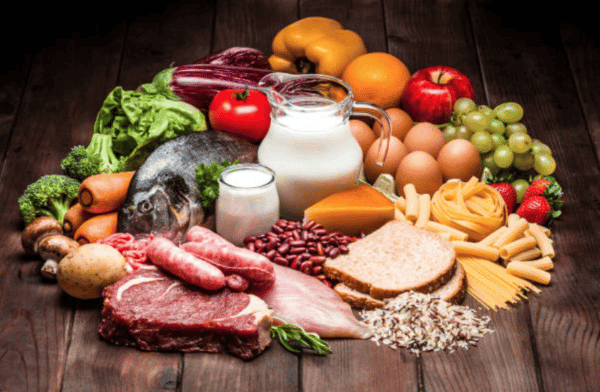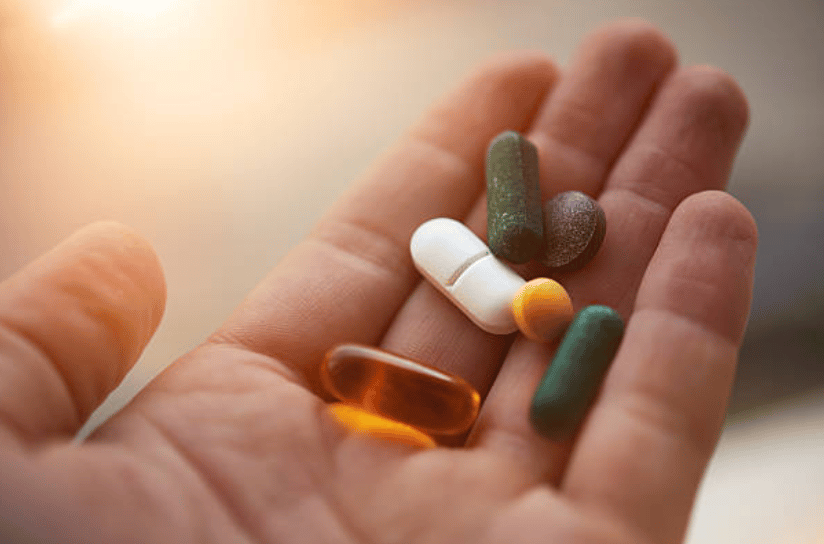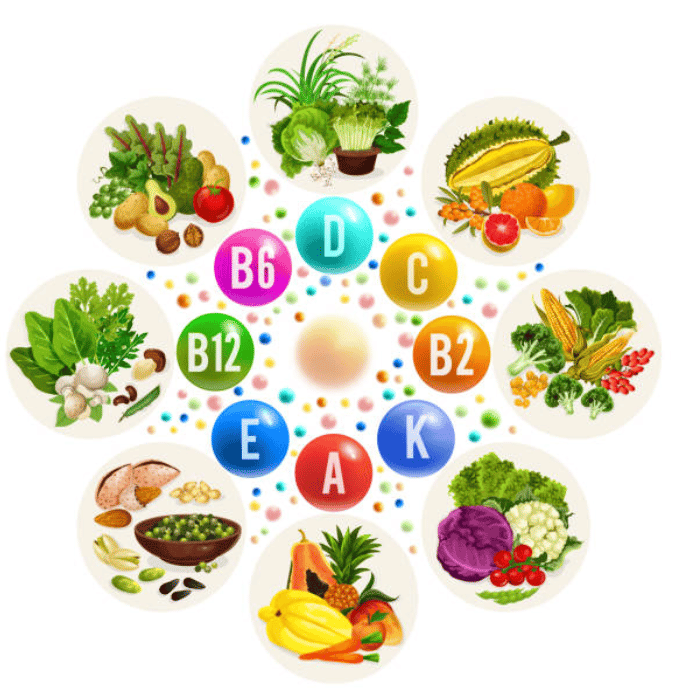Pour bien fonctionner notre corps à besoin de nutriments. Ces nutriments contiennent 2 familles qui sont les macronutriments et les micronutriments qui sont essentiels à notre santé. Il faut donc manger sainement, varié et avoir une alimentation équilibrée pour donner à notre organisme le bon apport journalier recommandé dont il a besoin en fonction des dépenses énergétiques de la journée qui va s’écouler.
Ainsi, le corps sera prêt aux efforts et activités de la vie quotidienne mais aussi aux entrainements de musculation que nous lui ferons subir. Les apports nutritionnels conseillés ou ANC, sont la quantité suffisante de différents nutriments nécessaires pour assurer le bon fonctionnement de notre corps humain.
Zoom sur les macronutriments et les micronutriments pour en savoir plus sur ce que nous devons consommer.
Les macronutriments et les micronutriments, en bref :
- Les macronutriments apportent l’énergie nécessaire au corps pour fonctionner.
- Les protéines, glucides et lipides sont les 3 types de macronutriments.
- Une bonne répartition des macronutriments est clé pour la santé.
- Les micronutriments ne fournissent pas d’énergie mais sont indispensables au bon fonctionnement du corps.
- Les vitamines et minéraux jouent un rôle clé dans la régénération cellulaire et le système immunitaire.
- Une alimentation équilibrée permet d’éviter les carences.
- Les sportifs ont des besoins accrus en vitamines, minéraux et oligo-éléments.
- Une supplémentation peut être nécessaire pour combler certaines carences.
- Un bilan de santé permet d’évaluer les besoins en micronutriments.
Sommaire
Qu’est-ce que les macronutriments ?
Les macronutriments contiennent les protéines, les glucides et les lipides. L’énergie dont notre corps a besoin pour fonctionner vient de ce carburant-là. Lorsque nous pratiquons la musculation, répartir ses macronutriments convenablement est essentiel à notre progression que ce soit pour une prise de muscle ou une perte de graisse ou même sans objectif spécifique.
Dès lors que vous adoptez cette méthode de calcul, vous serez plus performant dans votre activité sportive.
Les règles de base sont simples, si vous mangez plus de calories que ce que vous dépensez alors vous prendrez du poids, et à l’inverse si vous consommez moins de calories vous perdrez du poids mais là encore, il ne suffit pas de ne plus manger pour perdre du poids mais de calculer convenablement vos macros afin de ne pas être en carence de quoi que ce soit et donc adopter une diète correcte qui soit bonne pour votre santé.
Les protéines
1 gramme de protéine équivaut à 4 calories. Les aliments riches en protéines sont :

les oeufs, le poisson (thon, saumon), la viande rouge ou blanche, les produits laitiers (laitages), certaines légumineuses (légumes secs), les aliments à base de céréales, le soja, les noix, épinard et lentilles…
Les protéines sont plusieurs acides aminés assemblés entre elles et sont au nombre de 20 donc les 10 acides aminées essentielles suivantes:
l’arginine, l’histidine, l’isoleucine, la leucine, la lysine, la méthionine, la phénylalanine, la thréonine, la valine, le tryptophane.
Selon l’activité et la pratique sportive, la consommation des protéines varie entre 0,8 et 2 grammes par kilo de poids de corps. Rappelons qu’il n’est pas nécessaire d’en consommer plus car cela pourrait fatiguer nos reins et s’avèrerait donc contre-productif. De plus les personnes ayant déjà des problèmes rénaux doivent donc surveiller leur consommation.
Les protéines servent à régénérer les cellules et les fibres musculaires. Elles participent au renouvellement des ongles et cheveux. Elles apportent les enzymes digestives, les hormones et les anticorps entre autres et donc importante pour le bon fonctionnement de nos muscles. Leurs fonctions peuvent être structurale ou métabolique. La première reprend ce que nous avons cités ci dessus et la seconde est responsable des réactions chimiques essentielles au fonctionnement de l’organisme.
Les glucides
1 gramme de glucide équivaut à 4 calories. Dans les glucides, on retrouve sont les aliments comme la farine, le sucre, le riz et les jus de fruits….
Ils donnent de l’énergie aux muscles et au cerveau et tout sportif doit en consommer. Ils se transforment en glucose et le corps se sert d’une partie comme énergie directe et l’autre est stockée en glycogène dans les muscles et le foie.
Dans les glucides figurent aussi certains légumes qui contiennent également des prébiotiques et probiotiques dont notre corps a besoin pour notre santé.
Par exemple les flocons d’avoine, céréales complètes ou les artichauts contiennent des fibres et prébiotiques bons pour la flore intestinale. Cette famille de glucides contient toutes les fibres alimentaires qui ont pour rôle de ralentir la digestion et nous protéger de la constipation, régularise le cholestérol et lutte contre certains cancers. Ce sont elles qui nous donne l’impression d’être rassasié car elle gonflent dans notre estomac et de ce fait régule le transit.
Le yaourt à la grecque (ou fromage) quand à lui contient des micro-organismes vivants (probiotiques) également bons pour la flore. Certains pratiquants de musculation consomment ces probiotiques sous forme de compléments alimentaires. En effet selon leurs objectifs, ils doivent manger en plus grande quantité que des personnes sédentaires et de ce fait peuvent fragiliser leur flore intestinale. Cette supplémentation les aide à la digestion et permet de mieux assimiler les nutriments.
Les lipides
1 gramme de lipide équivaut à 9 calories. Dans les lipides, il y a les jaunes d’oeufs, les avocats, les olives, les fruits secs….
Les lipides fournissent de l’énergie et aident aux transports de certaines vitamines : Vitamines A, vitamines D, vitamines E et vitamines K qui ont un pouvoir de satiété. La vitamine D que l’on appelle aussi la vitamine du soleil est notamment retrouvée dans le chocolat noir ou les sardines (ou maquereau) en plus de la recevoir par la peau par l’intermédiaire des UV du soleil.
Les lipides contiennent eux des acides gras :
Acides gras saturés : exemple beurre, huile de coco
Mono-insaturés, poly-insaturés: par exemple huile d’olive, colza, avocat, saumon (oméga 3 et 6)
Les acides trans : les fritures et margarines
Les macronutriments sont des sources d’énergie que l’organisme va utiliser immédiatement ou sur plus long terme. Quoi qu’il en soit, notre organisme en a absolument besoin afin que notre corps fonctionne correctement.
Qu’est-ce que les micronutriments ?
Les micronutrients sont les vitamines et minéraux, les oligo-éléments et les acides gras essentiels.
A la différence des macronutrients, les micronutriments ne contiennent pas de calories mais sont absolument essentiels pour le processus biochimique de l’organisme. Elles sont là notamment pour le renouvellement des cellules, l’élimination des toxines ou luttent contre le vieillissement. Ils sont principalement consommés dans les fruits et légumes frais.

Certains micronutriments sont dit « essentiels ». Cela veut dire qu’ils ne peuvent pas être synthétisés par l’organisme et doivent être amenés par l’alimentation. Une carence de certains aliments dit essentiels conduira inévitablement à des maladies cardiovasculaires ou autres.
Les vitamines
Les vitamines hydrosolubles (vitamines B, vitamines C) apportés par les fruits et légumes sont gorgées d’eau
Les vitamines liposolubles (vitamines A, vitamines D, vitamines E et vitamines K) sont amenées principalement par les lipides.
Notre organisme n’en fabrique pas, donc manger équilibré pour avoir son apport quotidien ou se supplémenter permet d’apporter à notre corps tout ce dont il a besoin pour lutter contre la fatigue et améliorer ses défenses immunitaires. il existe en tout 13 sortes de vitamines qui vous apporteront des effets bénéfiques.
Les sels minéraux sont une catégorie de micro-nutriments issus de roches retrouvées dans les aliments sous leur forme naturelle et sont au nombre de 7. Le fer qui aide à fabriquer les globules rouges qui transportent l’oxygène dans le sang. Autre exemple, le cuivre pour le bon fonctionnement du coeur et l’entretien des cartilages. Il y en a évidemment d’autres mais je ne vais pas tous les citer.
Les oligoéléments
Et enfin les oligoéléments totalisent 15 variétés et en voici quelques uns : le sodium, le calcium, sélénium, cuivre, or, fer, fluor, zinc, phosphore, manganese et magnésium, antistress naturel qui régule le sucre dans le sang.
Oligo signifie peu, ils deviennent dangereux pour la santé si nous les consommons en trop grande quantité.

Les micronutriments contrairement aux macros, n’apportent pas d’énergie mais sont indispensables pour nos fonctions vitales. La répartition est d’environ 98% d’eau et de macronutriments et 2% de micronutriments. Ces derniers sont obligatoires pour notre équilibre alimentaire.
Conclusion
Normalement, notre alimentation nous permet de fournir à notre corps toutes les vitamines et minéraux nécessaires. Malheureusement, a l’heure actuelle, la qualité de la nourriture et des aliments que nous consommons sont altérés par l’industrialisation de nos denrées. En effet, les traitements industriels diminuent considérablement l’apport de ces vitamines et minéraux.
La pollution et le tabagisme détériorent voire détruisent ces vitamines et certains traitements médicamenteux réduisent l’absorption de certains micronutriments.
De plus, les pratiquants de musculation ou de sport ont besoin de plus de magnésium, zinc et autres vitamines. Les exercices intenses et prolongés fatiguent le muscle. S’il y a une carence en vitamines et minéraux, les os peuvent être fragilisés et les blessures plus fréquentes. De même qu’un surmenage ou une grossesse peuvent amener à devoir en consommer plus.
C’est pourquoi il est recommandé aux athlètes et aux personnes ne pratiquant pas d’activité physique de prendre des compléments alimentaires afin de pallier une éventuelle carence en vitamine. Attention toutefois à ne pas tomber dans l’excès non plus. La micronutrition doit être adaptée à chacun tout comme le calcul des apports journaliers recommandés.
Avant de décider de se supplémenter, il peut être judicieux de faire un bilan de santé en demandant à votre médecin une vérification par prise de sang ou test urinaire.
Et voilà, vous savez désormais ce que sont les macros et micronutriments, éléments essentiels pour notre organisme. Plus d’excuse pour se maintenir en bonne santé !

DÉCOUVREZ MON PLAN DIÈTE PERSONNALISÉ
Vous pensez que perdre du poids et du gras doit être synonyme de frustration alimentaire, de régime draconien et passer des heures sur un tapis de course à faire du cardio à outrance ?
GROSSE ERREUR !
FAQ
Les macronutriments (protéines, glucides, lipides) fournissent de l’énergie, tandis que les micronutriments (vitamines, minéraux, oligo-éléments) sont essentiels au bon fonctionnement du corps.
Ils permettent de fournir l’énergie nécessaire aux entraînements, de favoriser la prise de muscle et d’optimiser la récupération.
Un bon équilibre inclut une consommation élevée de protéines, un apport suffisant en glucides pour l’énergie et des lipides sains pour la récupération et la production hormonale.
Oui, ils participent au bon fonctionnement musculaire, réduisent la fatigue et améliorent la récupération.
Oui, la qualité des aliments modernes étant altérée par l’industrialisation, une supplémentation peut être nécessaire.
Les œufs, le poisson, la viande blanche et rouge, les légumineuses et certains produits laitiers.
Non, les bons lipides (avocat, huile d’olive, poissons gras) sont essentiels à la santé et ne font pas grossir s’ils sont consommés en quantités adaptées.
En cas de fatigue persistante, de carences avérées ou pour les sportifs ayant des besoins accrus en nutriments.






